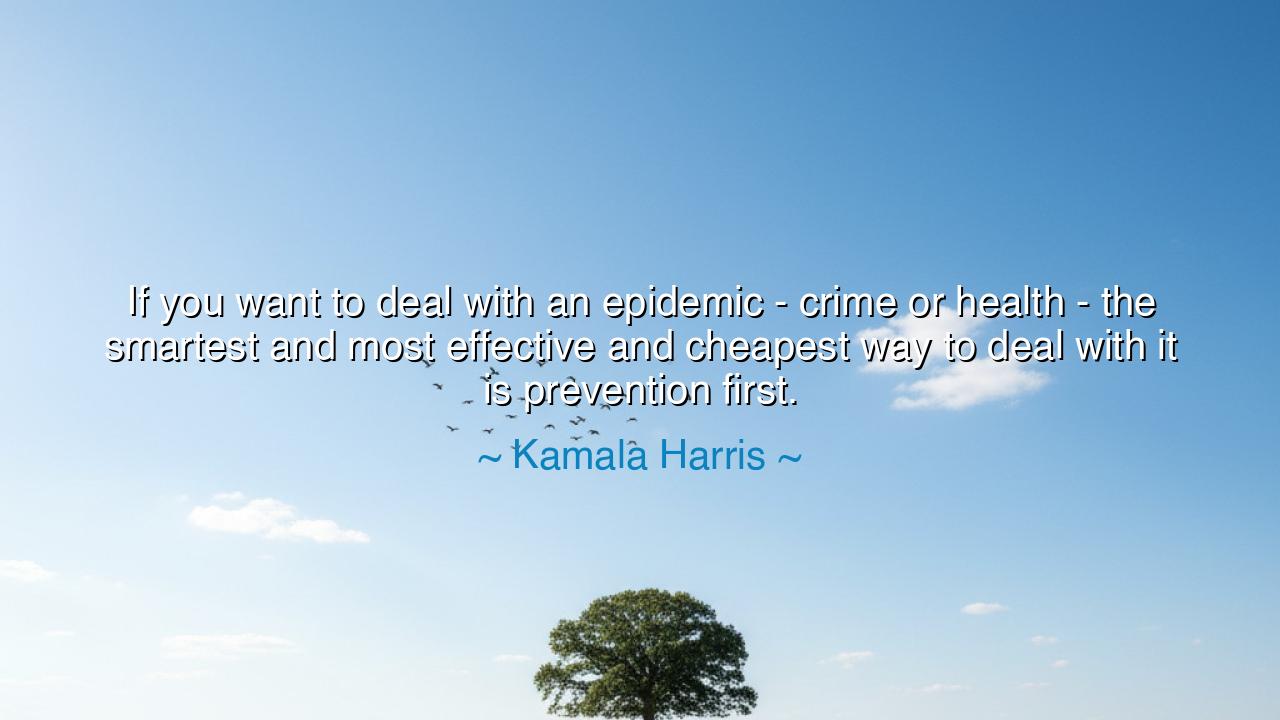
If you want to deal with an epidemic - crime or health - the
If you want to deal with an epidemic - crime or health - the smartest and most effective and cheapest way to deal with it is prevention first.






“If you want to deal with an epidemic — crime or health — the smartest and most effective and cheapest way to deal with it is prevention first.” — Kamala Harris
Hear these words of Kamala Harris, spoken with the clarity of one who has seen both the courtroom and the community, both the sickness and the symptom. Her teaching is simple in sound, yet vast in meaning: that the path of wisdom lies not in reacting to disaster, but in preventing it. She speaks not merely of medicine or law, but of human foresight, the divine gift that separates us from beasts and fate alike. To prevent is to see the seed before it becomes the tree, to calm the storm before it breaks, to guard the soul before it strays.
From the dawn of civilization, this truth has echoed through every art of governance and healing. The physicians of old understood that the body and the city are alike: both flourish when their balance is maintained, both decay when neglect takes root. The wise physician does not wait for fever to burn, nor does the just ruler wait for crime to fester. Yet humanity, ever distracted by spectacle, has long preferred to fight the flames rather than tend the kindling. Harris’s words are a call to return to ancient prudence: to choose prevention over punishment, preparation over cure, care over crisis.
Consider the story of the Roman aqueducts. Long before pestilence or plague could reach the heart of the empire, the engineers of Rome built vast systems to bring clean water and carry waste away. The citizens did not yet know the science of germs, yet they knew this truth—that public health begins before illness, in the unseen work of preparation. Because of their foresight, generations lived longer, cleaner, stronger. Thus Rome’s greatness was not only in its legions or laws, but in its unseen acts of prevention, born of discipline and wisdom.
So too in our own time. In cities where youth programs guide the lost before they fall to crime, the prisons remain less full and the streets more peaceful. In nations that invest in education, health, and care, the hospitals do not overflow. To prevent suffering is not weakness, but the highest form of strength. It demands not reaction, but vision; not anger, but compassion. Harris, in her words, honors this ancient truth: that the greatest leaders are gardeners, not warriors—they cultivate peace rather than wage endless war against its absence.
And yet, there is a sorrow hidden in her saying. For in every age, there are those who refuse to heed it—who wait until the harm is done, and then cry out for justice, for treatment, for answers. But the wise know that every cure begins long before the wound, and every act of justice begins long before the crime. The world may call prevention “boring,” but the ancients would call it holy. To prevent is to protect the living before they suffer; it is to act in harmony with time itself.
Let us then take this wisdom not as a saying, but as a command. In our homes, prevent quarrels by practicing kindness. In our bodies, prevent sickness by honoring rest and nourishment. In our communities, prevent hatred by planting understanding. In our nations, prevent despair by lifting the poor before they fall. These are not costly acts—they are the cheapest and most effective remedies of all, as Harris declared. For every act of foresight saves countless tears, and every moment of prevention spares generations of pain.
And so, my children of the future, remember this: the fires of the world do not begin as infernos, but as sparks. See them early. Act while they are small. Whether in crime or health, sorrow or sin, the same law rules all—prevention first. To live by this truth is to be wise; to ignore it is to be forever busy mending what need never have been broken. For the mark of a noble society, and of a noble soul, is not in how swiftly it heals its wounds, but in how few wounds it allows to form.






AAdministratorAdministrator
Welcome, honored guests. Please leave a comment, we will respond soon